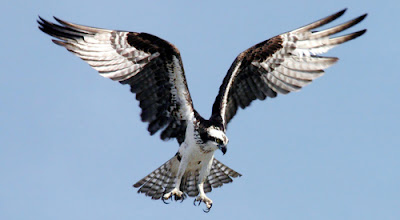Notes. Compare this version which features a kingfisher instead of an osprey: The Hawks and their Friends.
Summary: The hawks call upon their friends to protect their nest from dangerous humans.
Read the story below:
THE HAWK AND THE OSPREY
(osprey)
THERE lived once, on the shores of a natural lake, a Hawk on the south shore, a She-Hawk on the west shore, on the north a Lion, the king of beasts, on the east the Osprey, the king of birds, in the middle a Tortoise on a small island.
Now the Hawk asked the She-Hawk to become his wife. She asked him: "Have you any friends?"
"No, madam," he replied.
"But," she said, "we must have some friends who can defend us against any danger or trouble that may arise. Therefore I beg of you to find some friends."
"But," said the Hawk, "with whom shall I make friends?"
"Why, with King Osprey, who lives on the eastern shore, with King Lion on the north, and with the Tortoise who lives in the middle of the lake."
And he took her advice. And all these creatures formed a bond of friendship, and promised to protect each other in time of danger.
Now in time the Mother-Hawk had two sons. One day when the wings of the young birds were not yet callow, some of the country-folk went foraging through the woods all day and found nothing.
They went down to the lake to catch fish or a tortoise, and, in order to drive away the gnats, they made a fire by rubbing sticks together. The smoke annoyed the young birds, and they uttered a cry. The men said: " 'Tis the cry of birds—we will make a fire and eat their flesh." They made the fire blaze and built it up.
But the Mother-Bird heard the sound, and thought: "These men will eat our young ones. I will send my mate to the Great Osprey." This she did, and the bird promised to help.
He sat upon a tree-top near that in which the Hawks had built their nests, and no sooner did the men begin to climb up the tree than the Osprey dived into the lake, and from wings and back sprinkled water upon the brands and put the fire out. Down came the men and made another fire, but again the Osprey put it out, and this went on until midnight.
And the bird was tired out and his eyes were bloodshot. And the Mother-Bird whispered to her mate: "My Lord, the Osprey is worn out! Go and tell the Tortoise, that this weary bird may have a rest."
But the Osprey in a loud voice said he would gladly give his life to guard the tree. And the grateful Hawk said: "I pray thee, friend Osprey, rest awhile."
Then he went for help to the Tortoise, who said he would gladly help, but his son said: "I would not have my old father troubled, but I will gladly go in his stead."
And the Tortoise collected mud and quenched the flame. Then said the men: "Let us kill the Tortoise: he will be enough for all." But when they plucked creepers to bind him and tried to turn him over, he dragged them into the water.
And they said: "What strange things have happened to us! Half the night the Osprey has put out our fire, and now the Tortoise has dragged us in after him and made us swallow water. Let us light another fire, and at sunrise we will eat these young Hawks."
The Hen-Bird heard the noise and said: "My husband—sooner or later these men will devour our young and depart. You go and tell our friend the Lion."
At once the Hawk went to the Lion, who asked him why he came at such an unreasonable hour. But when the whole matter was put before him, he said: "Go and comfort your young ones, for I will save them." And then he came forth with a mighty tread, and the men were terrified.
"Alas!" they cried. "The Osprey hath put out our fire. The Tortoise dragged us into the water. But now we are done for: the Lion will destroy us at once." They ran this way and that, and when the noble beast stood at the foot of the tree, no trace could be found of the frightened men.
Then the Osprey, the Hawk, the She-Hawk, and the Tortoise came up to greet him, and they discoursed for a long time on the value of friendship. And this company of friends lived all their lives without breaking their bond. And they passed away according to their deeds.






